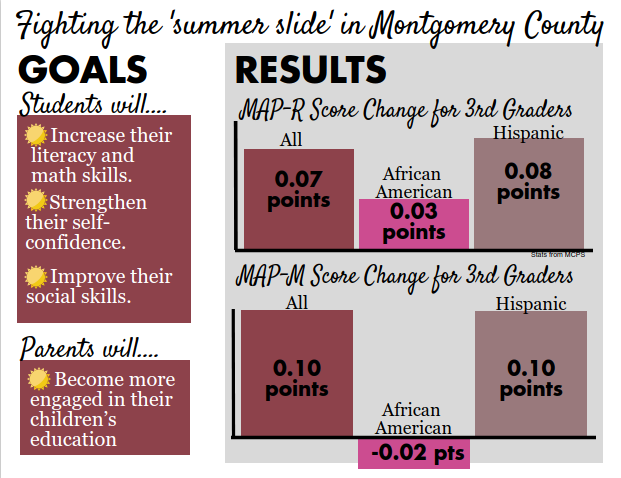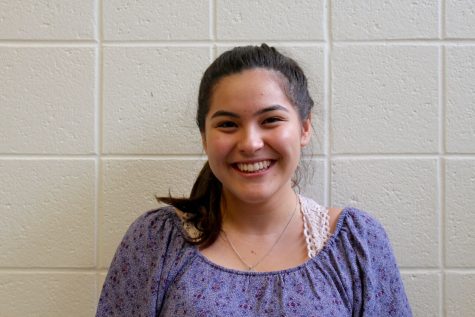MCPS pilots summer program to increase student equity
May 1, 2017
Almost every student has felt the grip of absolute panic at the beginning of the year when they look at the board and realize they can’t remember how to do fractions.
But for some students, the effects of this “summer slide” has a greater impact than a temporary blow to their self-esteem.To combat this trend, MCPS piloted a new summer program for rising third and fourth graders in low-income schools which served approximately a thousand children in the summer of 2016.
The “summer slide” refers to the loss of academic knowledge over the course of school breaks, which more commonly impacts low-income and minority groups due to the lack of easy accessibility to enriching summer camps and programs, according to a 2010 John Hopkins University Study. The result is that the next school year, students are drastically behind wealthier peers in terms of reading and math performance—a gap that grows cumulatively each year, according to Building Educated Leaders for Life (BELL), the non-profit organization that created the program.
“There’s been a lot of data that shows if you’re not reaching the metrics around reading, writing and math from third to fourth grade, that just compounds, and then you have issues around graduation rates,” Chief Academic Officer Maria Navarro said. “It’s a very important moment to intervene.”
Recently released results from both the BELL program evaluation and MCPS’ evaluation were promising, with participating students showing growth in post-program evaluations and slightly greater performance in fall standardized tests compared to students who had declined to attend, according to an evaluation report by the MCPS Office of Shared Accountability.
We know student learning is an everyday experience. It doesn’t start with the first day of school, it doesn’t end with the last day of school.
— chief academic officer Maria NavarroParticipating students were chosen from Title 1 schools, which receive additional federal funding due to their high percentages of kids on Free And Reduced Meals (FARMs). Students who scored below the 60th percentile on the district-wide Measurement of Academic Progress assessments in reading or math (MAP-M or MAP-R) were offered spots in the program.
Eight elementary school sites were chosen from the 25 schools involved to host the program, which was taught by MCPS teachers trained by BELL.
More significant than the positive test scores was the confidence and community students came away with, said principal intern Marybeth Mantzouranis from Watkins Mill Elementary school, one of the host sites.
“[The kids] loved it. They did make academic growth, but if nothing else, it helped them stay connected to school,” Mantzouranis said. “My students that participated in BELL had a level of confidence in their academics that they didn’t have before, which is a wonderful thing.”
The program consisted of five weeks of reading and math instruction, with weekly field trips and other enrichment opportunities.
“We know student learning is an everyday experience. It doesn’t start with the first day of school, it doesn’t end with the last day of school,” Maria Navarro said. “So we were excited to partner with BELL because they support a time and place when formal schooling isn’t in session, and they integrate components of learning that are pivotal to create well-rounded young adults.”
The program is currently funded for the next four years by the BELL organization, MCPS, Montgomery County Council and the Norman R. Rales and Ruth Rales Foundation. While all four partners hope to continue and expand the program, as recommended by the MCPS evaluation, the program will already cost approximately $5.5 million for the first four years, estimated councilwoman Nancy Navarro, a supporter of the program.
“Usually the biggest challenge for districts is that when they identify a program that gives great results, there’s always a funding limitation, so they end up not scaling it up,” Nancy Navarro said.







